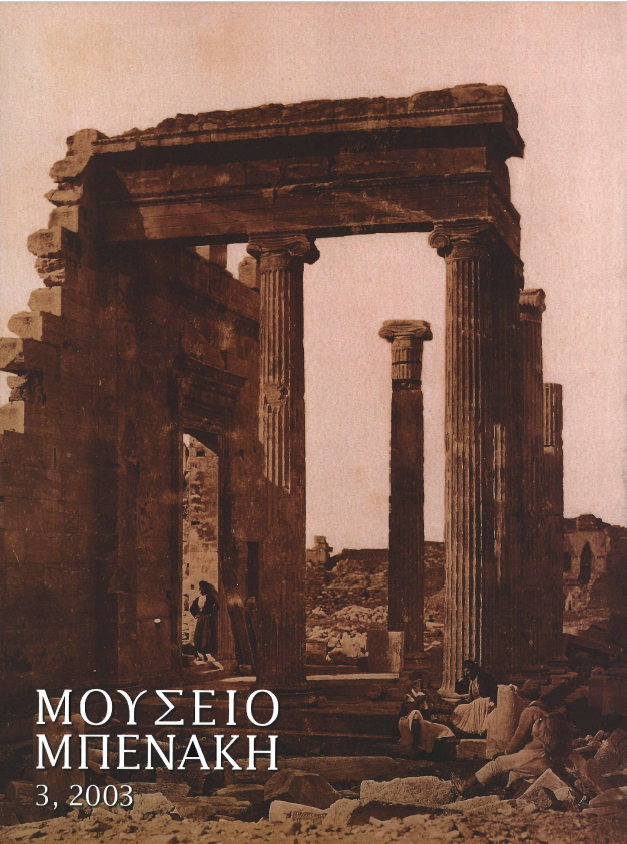Byzantium 330-1453: an important exhibition abroad
Abstract
The Benaki Museum and the Royal Academy of Arts in London were the joint organisers of the spectacular exhibition Byzantium 330-1453 held at the Royal Academy, which was officially opened on 25th October 2008 by the then Prime Minister of the Hellenic Republic and remained open to the public until 22 March 2009. The favourable reviews and more than 340,000 visitors make it one of the most popular and important exhibitions ever to celebrate Byzantium. The exhibition gave a comprehensive, detailed and explanatory record both of the development and the spread of Byzantine art from the founding of Constantinople to its conquest by the Ottomans, through 323 works of outstanding importance, generously loaned by 72 museums and cultural institutions from 20 countries. Arranged in nine sections, the exhibition smoothed the passage of even the least well prepared visitor through the exposition of the subject. The works in the first section: “The Beginnings of Christian Art” pointed up the debts owed by Early Byzantine art to Greek Antiquity. The second section “From Constantine to Iconoclasm” contained objects of outstanding workmanship, made of precious materials and presenting unusual iconography. The panorama of Byzantine art was made up of objects used in the Great Palace (“At Court” section), ceramics, examples of metalwork and jewellery intended for ordinary people and domestic use (“At Home” section), as well as objects used in the church services (“At Church” section). In the sixth section “Icons” there was an eclectic selection of mosaic icons and double-sided processional icons, works typifying the painting of Constantinople and others representing the so-called Cretan School. The influence exercised over Western art by that of Constantinople was traced in the seventh section “Byzantium and the West”, which explored the contribution made by Byzantine icons to the style of pre-Renaissance Italian painting. Art works from Russia, Bulgaria and Serbia were included in the “Beyond Byzantium” section. The last part of the exhibition was dominated by the Monastery of St Catherine at Sinai. The exhibition was accompanied by a richly illustrated catalogue, which was subsequently translated into Greek. Curators of the exhibition were on behalf of the Royal Academy of Arts Robin Cormack, Emeritus Professor of the History of Art at the Courtauld Institute of Arts, London, and on behalf of the Benaki Museum Maria Vassilaki, Associate Professor of the History of Byzantine Art at the University of Thessaly. Both of them edited the exhibition catalogue. Many distinguished scholars and dear friends assisted this Benaki Museum project by serving on the exhibition’s Honorary Committee under the patronage of HRH The Prince of Wales: the then Minister of Culture Michalis Liapis, the Greek Ambassador to London HE Vassilis Pispinis, Damianos, Archbishop of the Monastery of St Catherine at Sinai, Cardinal Angelo Scola, Hιlθne Ahrweiler, Charalambos Bouras, Antony Bryer, David Buckton, Averil Cameron, Nicholas Egon, Judith Herrin, Angeliki Laiou, Edmιe Leventis, Cyril Mango, Victoria Solomonidis, Euthymios Tsigaridas, Panayotis Vokotopoulos, Nikolaos Zias. The Organising Committee was made up of: Aimilia Yeroulanou (President), Michele Bacci, Elka Bakalova, Demetra Papanikola-Bakirtzi, Anna Ballian, Leslie Brubaker, Gudrun Bόhl, Nano Chatzidakis, Dimitris Constantios, Robin Cormack, Anthony Cutler, Anastasia Drandaki, Jannic Durand, Antony Eastmond, Chris Entwistle, Helen C. Evans, Christian Frstel, Liz James, Ioanna Koltsida-Makri, Ioli Kalavrezou, Christine Kondoleon, Adrian Locke, John Lowden, Eunice Dauterman-Maguire, Henry Maguire, Marlia Mundell Mango, Thomas F. Mathews, Valentino Pace, Yuri Piatnitsky, Mikhail Piotrovsky, Norman Rosenthal, Nancy Patterson evenko, Engelina Smirnova, Gojko Suboti, Marica uput, Alice-Mary Talbot, Yannis Tavlakis, Anastasia Tourta, Paraskevi Vasilopoulou, Maria Vassilaki, Gary Vikan, Annemarie Weyl Carr, Paul Williamson, Vera Zalesskaya. The support of the sponsoring institutions, the J.F. Costopoulos Foundation, the A.G. Leventis Foundation and the Stavros Niarchos Foundation, was crucial in funding the overall costs of both the exhibition and its important catalogue.
Article Details
- How to Cite
-
Γερουλάνου Α. (2013). Byzantium 330-1453: an important exhibition abroad. Mouseio Benaki Journal, 9(9), 45–59. https://doi.org/10.12681/benaki.9
- Issue
- Vol. 9 (2009)
- Section
- Articles
The copyright for articles published in Mouseio Benaki is retained by the author(s), with first publication rights granted to the journal. By virtue of their appearance in this open access journal, articles may be used freely for non-commercial uses, with the exception of the non-granted right to make derivative works, with proper reference to the author(s) and its first publication. The Benaki Museum retains the right to publish, reproduce, publicly display, distribute, and use articles published in Mouseio Benaki in any and all formats and media, either separately or as part of collective works, worldwide and for the full term of copyright. This includes, but is not limited to, the right to publish articles in an issue of Mouseio Benaki, copy and distribute individual reprints of the articles, authorize reproduction of articles in their entirety in another publication of the Benaki Museum, as well as authorize reproduction and distribution of articles or abstracts thereof by means of computerized retrieval systems.
Downloads
Download data is not yet available.




